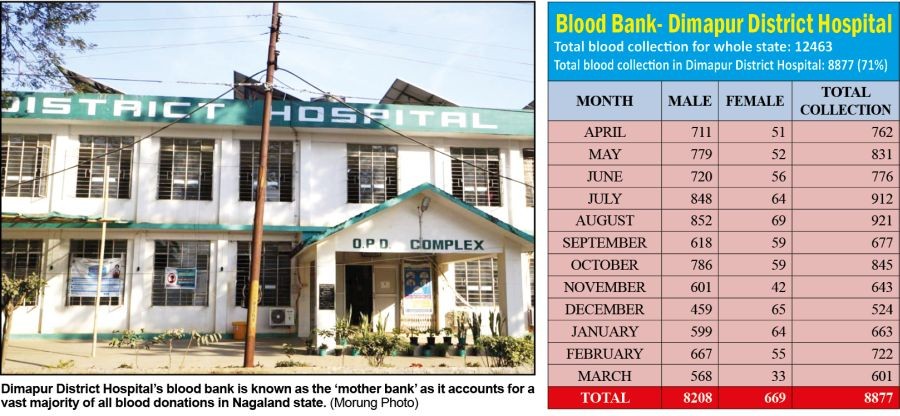
Dimapur District Hospital (DDH) blood bank dubbed as the ‘mother bank’
Mongsentong Longkumer
Dimapur | June 16
Between the periods of 2019-2020, a total of 8,877 individuals donated their blood at the Dimapur District Hospital (DDH), dubbed as the blood bank distributor for entire Nagaland. During that same period, the State witnessed a total of 12,463 blood collections, with Dimapur making up about 71% of that amount. This was according to data put out by officials at Dimapur District Hospital (DDH) during World Blood Donors Day on June 14.
Dr Temsu, in-charge of DDH blood-bank told The Morung Express that had it not been for the pandemic, “we would’ve crossed the 10,000 mark.” The data revealed that within the 8,877 individuals who donated their blood, males accounted for 8,208 while females made up 669.
He opined that the stark gap in the other districts as compared to Dimapur is because there are many communities living in Dimapur, both Naga and Non-Naga. What’s more, he stated that “the way we are motivated here in Dimapur through the media is very high compared to other districts.”
Comparing the attitude and perception of Nagas, he noted how, “When lightning strikes, then only we are compelled to give; otherwise we don’t have the practice of donating blood due to a number of cultural or societal reasons.”
Dr Temsu explained that the hospital primarily has two sources from where they receive blood; one is through advance donation given by NGOs and organisations. The other is through emergency donation provided by family individuals of the patient or by willing volunteers.
The blood bank at Dimapur, he said is also the main provider for districts such as Kiphire, Tuensang, Mon, Peren and even at Naga Hospital Authority, Kohima, while also supplying private hospitals in Dimapur during times of need. “That is why we are called the mother bank,” he stated.
Moreover, he noted that except for the district hospitals in Dimapur, Mokokchung, and Kohima, the rest of the district hospitals have a blood bank “only in name and paper.”
Dr Temsu mentioned that the common practice in the State among the people is only avail blood only during emergency operations, without storing anything else at the DDH blood bank. “Otherwise, a blood bank should be about storing blood and keeping it for future purposes,” he reminded.
In spite of shortcomings he noted how organising awareness campaigns through the NSS, Red Ribbon club etc have reaped considerable returns for the DDH blood bank.
“Most of the individuals who came forward to donate their blood were through NGOs and organisations without which this blood bank would not be able to function,” he remarked.
Hemophilia Society Nagaland Chapter
Hemophilia is an incurable hereditary bleeding disorder that prevents the ability of the blood to clot within the human body due to absence or deficiency of clotting factors. In Nagaland, there are 10 hemophilia patients as of now, according to the Hemophilia Society Nagaland chapter.
Its President, Rhonthungo Ezung, shared that the rare condition afflicts children the most. He revealed that he came to know about the condition in 2012, when his then nine month old son was diagnosed with the disorder during an operation. “We went to Guwahati for treatment and the doctors said that my son was afflicted with factor deficiency, which was a case of severe hemophilia known as Factor VIII deficiency,” he said.
As the medication for treating the disorder was costly, his family took the help of the Hemophilia Federation of Guwahati chapter to avail them on subsidy. This treatment known as replacement therapy involves the patients receiving clotting factors by injection or intravenously through the veins. However, as the medication was expensive and had to be imported from abroad, they were not able to continue this arrangement for long.
Ezung said that he later contacted the parents of other patients in Nagaland who were going through the same problem as them. “As there were no medical colleges or hemophilia treatment centers in Nagaland, we were finding a lot of difficulty, both physically and financially travelling to Guwahati for treatment,” he mentioned.
Due to which, along with the parents of the patients, they set up the Hemophilia Society Nagaland chapter (HSNC) through signing of petitions between the periods of 2017-18. After a lapse of two years and owing to the pandemic, HSNC was finally registered with the government on May 24, 2022. “Through this we hope that we will be able to get the schemes being provided by governments in other states for such cases,” he noted.
The society has its head office set up at Aoyimti village, Dimapur with the help of the parents of patients, well-wishers and the like.
He says the aims and objectives of HSNC includes working for the benefit of persons with hemophilia (PWH), finding legal access towards finding treatment and encouraging individuals to donate blood.
Ezung nevertheless added that there might be many more people suffering from this disorder; however they were yet to be identified or register with HSNC due to lack of awareness, medical support and care facilities.
He informed that the HSNC is taking steps to reach out, indentify and register all patients in the State through creating awareness on Facebook, newspapers, leaflets and other means.






